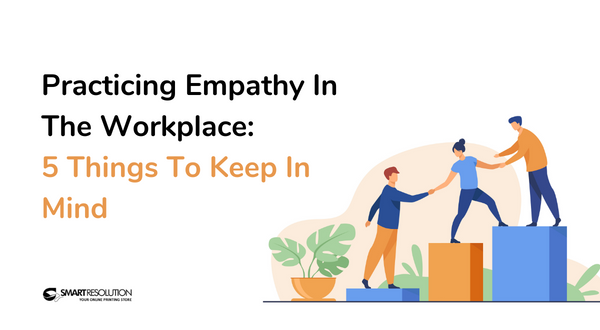In the workplace, empathy is an essential tool in building positive relationships. Empathy is the ability to understand and share another person’s feelings, and it can be an invaluable skill when it comes to giving compliments. Compliments are a great way to show appreciation, motivate employees, and boost morale, but only if they are given with genuine empathy.
In this blog post, we will explore 5 things to keep in mind while practicing empathy in the workplace. From understanding the importance of active listening to being aware of our own biases, we will delve into the key elements of empathy that can help us build stronger relationships with our colleagues and create a more positive and productive work environment.

How giving compliments can help:
Empathy also plays a role in receiving compliments. When someone takes the time to compliment you, it is essential to be open and receptive to it. Recognize the effort the person made to give the compliment and take it as a positive and valuable feedback. This shows empathy and appreciation for the other person’s point of view.
Giving compliments is not only a way to show empathy but also a way of creating a positive work environment. A positive work environment is crucial for employee satisfaction and motivation. Employees who feel appreciated and valued are more likely to be motivated and engaged at work. This, in turn, leads to increased productivity and better overall performance. Furthermore, giving compliments also helps to build trust and respect among colleagues.
Here are 5 things to keep in mind while complimenting your colleagues:
1. Be sincere
Being sincere means avoiding generic compliments or comments that could be taken as insincere or patronizing. Instead, take the time to think about what you’re saying, and make sure the compliment is specific and meaningful. Instead of saying “good job”, you can say “I really appreciate how you handled that situation”.
2. Be mindful
Before giving a compliment, ask yourself if it is appropriate in the given context. For example, if someone has just had a difficult day, it may not be the right time to compliment them. Additionally, it’s important to be aware of the power dynamics in the workplace, and definitely not to use compliments to coerce or control others.
3. Practice active listening
Active listening involves really listening to what the other person is saying and trying to understand their perspective. This can help create a safe space for compliments, as it shows that you are genuinely interested in the other person’s experience.
4. Be aware
Be careful not to single out one person, as this could make others feel excluded. Additionally, focus on the positive rather than the negative aspects of the situation.
5. Be timely
Give compliments in a timely manner, as close to the event as possible. This helps to ensure that the complement is fresh in the mind of the person receiving it and has more impact. It also shows that you were paying attention and that you truly noticed and appreciated their work.
How you can show your appreciation:
One way to show your appreciation for colleagues is by giving them a handwritten card. This not only gives a personal touch to the compliment but also serves as a reminder for the person receiving the compliment. It also helps to create a positive and uplifting atmosphere in the workplace. This National Compliment Day, it is important to take the time to recognize and appreciate the contributions of your colleagues.
Giving sincere and specific compliments can help to build stronger relationships, increase morale, and improve overall productivity.



